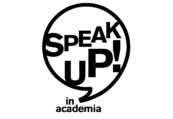Alice’s Speech from the evening of the launch:
“You arrived in Zürich young, fresh and excited. With a job offer from one of the best research institutions in the world – an institution with star-status and the best minds. In a country known for its innovation, for its best practice and cutting-edge technology.
You worked hard to get here – graduating from the best schools. You arrived keen – you like learning, education, schools, teachers, institutions. You got ahead by playing by their rules.
But then, you start to notice something’s up – something’s not quite right – you feel unsure, unsettled. Is it about how knowledge here is being produced and published? Is it about how people are being treated?
A few old-timers try and warn you – give you a few hints in-between the lines – it seems like there is some insider’s knowledge – but you can’t quite grasp it.
So you think – it must be me – I don’t want to lose this job – I can’t afford to lose the money –Switzerland is expensive. Or, how am I going to explain this to the migration office – I can’t lose my work permit. And most of all you think – I don’t want to be a troublemaker. I’ll just put my head down and work harder.
Then one day it’s too much – it might be a specific episode that triggers you – or maybe you speak to friends and family who convince you this is not ok – its unacceptable.
But can you speak out? The costs are high – the institution and your supervisor far outweigh your junior status – you even admire their work, their contribution to academia. But something tells you, you have a duty to speak out, to report what you’ve seen – even if you would rather not.
People warn you: don’t open the Pandora’s box, don’t betray your group, the school here tries to bury stories – you’re risking too much.
And indeed – when you do speak out the problems start. You have to build your own case, find allies, and expose yourself. Your reports are not treated with confidentiality. You are made to feel like you are the troublemaker. You are interrogated for hours, your behaviour comes under scrutiny – if this is true why didn’t you speak up earlier they ask you? You struggle to get legal counsel, you are not kept informed, the files are kept secret from you, and you are made to sign a secrecy agreement. And in the end – your allegations are dismissed.
But you make it through – because at your sides, dozens of other voices decide to speak up as well – and their bravery spurs you on. Because decent colleagues show their support – tell you what you are doing is necessary and a service to the school. Because you find a decent lawyer – and generous donors to pay her. Because friends and family stick with you, listen to endless debriefs and give you strength.
And once the investigation is over – you have nothing to lose – knowing that the process did not have your best interests at heart. Knowing that to protect your interests you need to reach out to allies, inside and outside the school.
You learn that you were not the only ones – you are just the tip of the iceberg. And you start hearing a choir of voices from groups all over the school who are going through the same process. Together you have experienced similar struggles, similar difficulties.
So together you decide to launch a new group and call it Speak Up!
It will be a place to share such experiences, to be heard and listened to – to learn peer-to-peer about what it takes to make a claim, a network to find emotional support, legal and financial advice. And a group that can build on its experiences and expertise to lobby for better practices in preventing, investigating and condemning misconduct.
And now we promise ourselves and others that:
When we witnesses and experience misconduct we … Speak Up!
As by-standers we won’t ignore discrimination and harassment but … Speak Up!
When we see breaches of scientific practice we … Speak Up!
Instead of sweeping misconduct under the carpet we … Speak Up!
And to make academia a better place to work and study we … Speak Up!”

